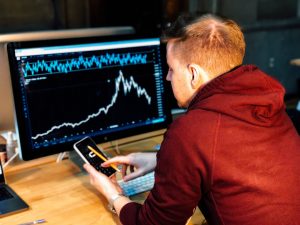Forex trading, also known as foreign exchange trading, is the process of buying and selling currencies in the global financial market. Banks are major players in the forex market, and their participation in this market has been growing steadily over the years. In this article, we will discuss how banks are trading forex and the reasons behind their involvement in this market.
Banks are involved in forex trading for several reasons. Firstly, they provide forex services to their clients, including currency exchange, international money transfers, and hedging against currency risk. Secondly, banks trade forex to generate profits for themselves. They do this by buying and selling currencies at different prices, hoping to make a profit from the difference between the buying and selling prices. Thirdly, banks trade forex to manage their own currency exposures, which is a critical aspect of their business.
Banks trade forex by using a variety of strategies, including spot trading, forward contracts, options, and futures contracts. Spot trading is the most common type of forex trading, where banks buy and sell currencies at the current market price. Forward contracts are agreements between two parties to buy or sell a currency at a predetermined price on a future date. Options are contracts that give the buyer the right, but not the obligation, to buy or sell a currency at a predetermined price on a future date. Futures contracts are similar to forward contracts, but they are traded on an exchange and are standardized contracts.
Banks have access to a wide range of information and resources that enable them to make informed trading decisions. They use sophisticated trading platforms that provide real-time market data and analysis, allowing them to monitor currency prices and make quick decisions. They also have access to research reports and analysis provided by their in-house research teams, which help them to identify trading opportunities and trends in the market.
One of the advantages that banks have in forex trading is their ability to access liquidity. Banks are major players in the forex market, and they have access to significant amounts of capital that they can use to trade currencies. This means that they can buy and sell currencies in large volumes, which enables them to take advantage of small price movements and generate profits.
Another advantage that banks have in forex trading is their ability to manage risk. Banks have sophisticated risk management systems in place that enable them to identify, measure, and manage the risks associated with forex trading. They use a variety of tools and techniques to manage currency risk, including hedging, diversification, and using derivatives.
Banks are also subject to regulatory requirements when it comes to forex trading. They are required to comply with various regulations and guidelines that are designed to ensure the safety and stability of the financial system. These regulations include capital requirements, reporting requirements, and risk management requirements.
In conclusion, banks are major players in the forex market, and their participation in this market has been growing steadily over the years. They trade forex for several reasons, including providing forex services to their clients, generating profits for themselves, and managing their own currency exposures. Banks use a variety of strategies and have access to a wide range of information and resources that enable them to make informed trading decisions. They also have advantages in terms of liquidity and risk management, and are subject to regulatory requirements when it comes to forex trading.





